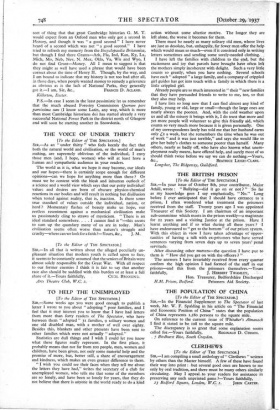TO HELP THE UNEMPLOYED
[To the Editor of THE SPECTATOR.] SIR,—Some weeks ago you were good enough to publish a letter I wrote to you about " adopting " poor families, and I feel that it may interest you to know that I have had letters from more than forty readers of The Spectator, who have between them " adopted " 3! families, 9 solitary women and one old disabled man, with a mother of well over eighty. Besides this, blankets and other presents have been sent to other families which were not actually " adopted."
Statistics are dull things and I wish I could let you know what these figures really represent. In the first place, it probably means that not far from zoo people, men, women and children, have been given, not only some material help and the promise of more, but, better still, a share of encouragement and kindness, which makes an even greater difference to them.
" I wish you could see their faces when they tell me about the letters they have had," writes the secretary of a club for unemployed women, who tells me that some of the members are so lonely, and have been so lonely for years, that they do not believe that there is anyone in the world ready to do a kind action without some ulterior motive. The longer they are left alone, the worse it becomes for them.
There must be nearly as many solitary old men, whose lives are just as desolate, but, unhappily, far fewer men offer the help which would mean so much—even if it consisted only in writing letters sometimes and sending some sorely-needed clothing.
I have left the families with children to the end, but the excitement and joy that parcels have brought have often left the mothers simply incoherent with delight. Such a very little counts so greatly, when you have nothing. Several schools have each " adopted " a large family, and a company of crippled girl guides has got into touch with a family in which there is a little crippled girl.
Already people are so much interested in " their " new families that they have persuaded friends to write to me, too, so that they also may help.
I have lists so long now that I can find almost any kind of family, young or old, large or small—though the large ones are nearly always the poorest. And, with the cold weather upon us and all the misery it brings with it, I do trust that more and yet more people will volunteer to give this friendly aid, which counts so very much more because it is given personally. One of my correspondents lately has told me that her husband earns only £2 a week, but she remembers the time when he was out of work " and it was just terrible," and says she would like to give her baby's clothes to someone poorer than herself. Many others, nearly as badly off, who have also known what unem- ployment really means, have offered help, and surely most of us should think twice before we say we can do nothing.—Yours,


























































 Previous page
Previous page